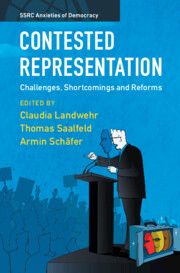Book contents
- Contested Representation
- SSRC Anxieties of Democracy
- Sponsored by the Social Science Research Council
- Contested Representation
- Copyright page
- Contents
- Figures
- Tables
- Contributors
- Acknowledgments
- 1 Introduction
- Part I The Contested Idea of Political Representation
- Part II Representation and Responsiveness in Unequal Societies
- 7 Reconsidering Representation
- 8 All about the Middle Class?
- 9 Unequal Representation and the Right-Wing Populist Vote in Europe
- 10 What Do Voters Think about the Descriptive Underrepresentation of the Working Class?
- Part III Polarization, New Cleavages, and Shifts in Democratic Government
- Part IV Constitutional Crisis and Institutional Reform
- Bibliography
- Index
7 - Reconsidering Representation
How the Same Data Can Produce Divergent Conclusions about the Quality of Democratic Responsiveness in the United States
from Part II - Representation and Responsiveness in Unequal Societies
Published online by Cambridge University Press: 03 November 2022
- Contested Representation
- SSRC Anxieties of Democracy
- Sponsored by the Social Science Research Council
- Contested Representation
- Copyright page
- Contents
- Figures
- Tables
- Contributors
- Acknowledgments
- 1 Introduction
- Part I The Contested Idea of Political Representation
- Part II Representation and Responsiveness in Unequal Societies
- 7 Reconsidering Representation
- 8 All about the Middle Class?
- 9 Unequal Representation and the Right-Wing Populist Vote in Europe
- 10 What Do Voters Think about the Descriptive Underrepresentation of the Working Class?
- Part III Polarization, New Cleavages, and Shifts in Democratic Government
- Part IV Constitutional Crisis and Institutional Reform
- Bibliography
- Index
Summary
Many scholars have sounded an alarm about the extent of unequal representation in advanced democracies.1 In Democracy in America? Benjamin Page and Martin Gilens (2017, 68) conclude, “average citizens exert little or no influence on federal government policy” (italics in original). Researchers studying the UnitedStates (Bartels 2008; Gilens 2005; Gilens 2011; Gilens and Page 2014; Gilens 2016; Jacobs and Page 2005; Jacobs and Skocpol 2005; Page and Gilens 2017), Germany (Elässer, Hence, and Schäfer 2017), the Netherlands (Schakel 2019), and other countries (Giger, Rosset and Bernauer 2012) have reached similarly stark conclusions. This research, which finds that those in the upper 10 or 20 percent of the income distribution dominate the policy making process at the expense of those at and below the economic middle, has had a profound influence on academic literature, the media, and even political discourse.2
- Type
- Chapter
- Information
- Contested RepresentationChallenges, Shortcomings and Reforms, pp. 103 - 128Publisher: Cambridge University PressPrint publication year: 2022
- 1
- Cited by



